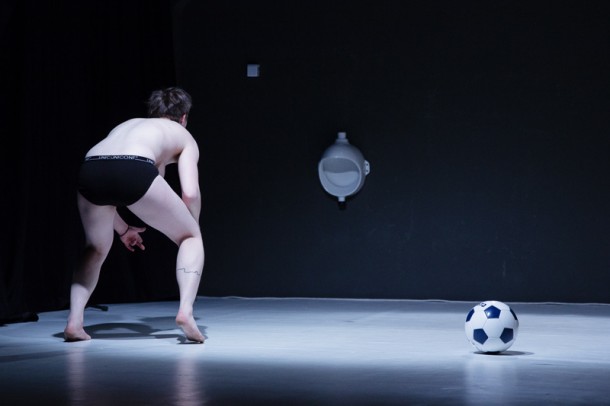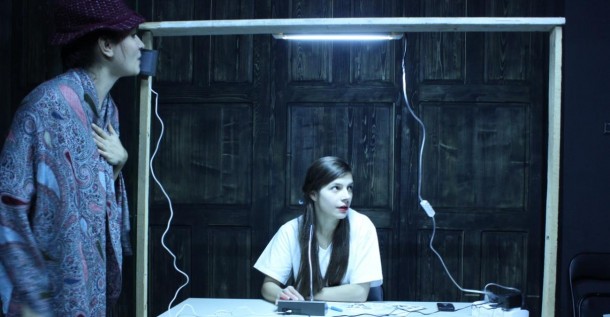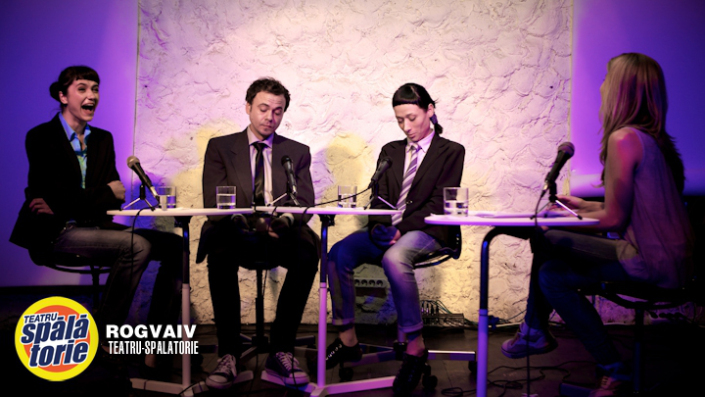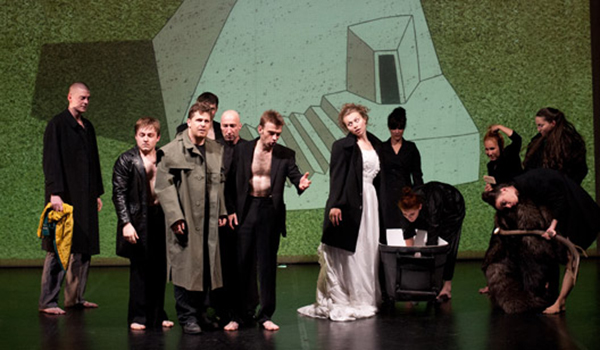These theatre festivals, to their advantage, offered an abundance of interpretations, points of view, narrations, and contradictions. It seems both festivals were dedicated to “Solidarity,” which was the theme for the 6th edition of Temps’d Images in Cluj-Napoca, Romania that took place in the first half of November 2013. The festival’s director, Miki Braniste, said that she wanted to ask questions about what makes us come together, empathize with others, open ourselves to differences, and examine the internal mechanisms stimulating our sense of solidarity.
To most post-communist Eastern European countries “Solidarity” denotes the Polish trade union that emerged in 1980 and all the ideals it represented. The Solidarity movement not only led to the first free elections in 1989 and the subsequent collapse of communism in Poland, but triggered the whole avalanche of ‘collapses,’ the Berlin Wall included. Perhaps even more importantly, the notion of solidarity unveiled the potential of grassroots initiatives, power of the oppressed, and the necessity to stay united as a community in the face of political adversity. But a lot of things have changed since 1989 and now we have to re-define this term. Re-definition in this case entails expanding the term to embrace such foundational ideas as freedom, issues like crossing borders, gender, human rights, the quality of relationships, and many others that the artists and performers participating in the theatre festivals in Cluj-Napoca and in Budapest shared with their audiences.
When observing the presentations of the Cluj-Napoca festival I noticed that most Romanian artists in their theatre work and visual and performing arts are searching for understanding, acceptance, tolerance, empathy, and for the right to be accepted as themselves by society; in a free translation we may call this a desire for solidarity. This search touches on sensitive issues like sexual identity, the abuse of authority, personal responsibility, the process of decision-making, and the nature of intimate relationships.
Parallel, created by Ferenc Sinko, is a contemporary dance as well as a conceptual performance. Two actresses, Lucia Marneanu and Kata Bodoki-Halmen, take us on a wondrous journey into their anxieties and preconceptions about sexual identity and social roles to explore the boundaries of our self-enslavement. It is a risky trip for those who don’t have a sense of humor nor cannot keep their distance, because nothing is obvious in this performance. It evolves in a dialogue about gender differences, emotional gaps, identities, biases, and (in)equalities. The performance is full of wit, sexist anecdotes, quotes, dressing-up, and interplay. But “though this be madness, yet there’s method in ’t”—the performance is a very important voice in the debate concerning social roles. Who has the right to decide who I am?—the actresses seem to ask. Why is one type of behavior tolerated and another is not? Why can’t I act as I like? These questions are posed in a puckish manner, thus they sometimes sound desperate and rough, but they deserve to be taken seriously.
The next performance, created by Mihai Pintilei and Radu Horghidan, who wrote and directed Dreaming Romania at the Fix Theatre in Lasi, is a comedy about the realities of the present day Romania. It shows current society’s behavioral patterns deriving from communist times. Several scenes, not connected by their plots, depict typical human relationships, dependencies, and everyday situations, yet show them in a distorting mirror. Fortunately, the explosion of the actor’s energy did not outshine the questions they asked: Will it last forever? Will it ever change? When will we become “a normal” country and society? When will we be healed? So far, the post-communist trauma is alive and well and not surrendering, but these young artists declare war on it. They grill the old communist ways by exposing and mocking hypocrisy and corruption. By doing this, however, they are not avoiding taking responsibility for their performance and their criticisms of the post-communist era. What’s more, the artists invite their audience to take from the performance whatever matters to them and make their own choices, as if they were saying to the viewer: we will show you our reality and you can think along with us and take home whatever you want.
In direct contrast to the Romanians, Mihaela Dancs, a dancer, and Cosmin Manolescu, a choreographer, entitled their performance A Piece With Limited Responsibility and it was indeed a smart idea. The performance starts with an audition for an absent choreographer. Two people are trying to guess the director’s expectations. By dancing, walking, and lying down they want to justify their presence on the stage and as a result they experiment with their borders and ask about their roles in the play and in their own lives. Their performance is a negotiation with the body, with their creative process, and their physical limits, but ultimately it provides no definitive answer about who is responsible for the final shape of the production. And what exactly is this final product? It is up to you to decide—they say—and start jumping, encouraging the audience to jump as well. The audience stands up, starts jumping, clapping, and singing some Madonna hit with the artists. The singing and jumping continues for twenty minutes and nobody wants it to end.
The next performance was Zic Zac, created by Andrea Gavriliu, an actress and a dancer who graduated from the Faculty of Choreography in Bucharest. The show starts with a DJ, and He and She in a night club. The DJ plays the music. Another journey begins—it is called a relationship. Something is happening to Her and His bodies, between Her and Him, Them, and DJ, their bodies and muscles and music, the dance floor and the touch. It is like music played as a catalyst for the release of pent-up emotions and desires. Hidden ardors and dreads disappear one after another. The actors lose themselves in each other, they discover the pleasures and complexities of their relationships, but also realize that all this can be destroyed by one careless move. This outstanding dance theatre shows that unity and solidarity are not easy to maintain. They may easily slip out of control and require special care.
I am very glad that these attempts to find solidarity or its synonyms did not provide definite answers. The issue is problematic, just like we all are. Nobody knows the correct answer and I believe it is absolutely fair enough to let everybody find the best one for themselves.
Almost all performances I saw in Cluj-Napoca and in Budapest focused on current discussions relating to coming to terms with the difficult communist past and the confusing post-communist reality. Corrupt Tour—World’s First Corruption Tour Company—“Enjoy the Best of the Worst!”—Petr Sourek, Czech philosopher and artist, welcomes the audience to Cluj. He runs the Corrupt Tour Team, which aims “to provide the most comprehensive range of corruption experiences.” Petr lives and works in Prague, but he is well known in Europe. He organizes walking and bus tours for travelers and exhibits Prague’s Monuments of Corruption. He talks about corrupt politicians and their connections with the police, district attorneys, various companies, and of course, friends. By explaining the mechanism of corruption, Sourek shows people’s dependency on money, power, and bargaining. He proves the shallowness and impermanence of human relationships, where money makes the world go around. His diagnosis is bitter, but be careful—there’s also a surprise. At the end of the show he offers the audience a chance to buy a diploma of Master of Corruption Administration for only ten Euros and he states it very openly: he wants to make money on corruption.
If this trick raises the performance to a higher level, the Moldavian Theatre Spālātorie takes us even higher. Clear History, written and directed by Nicoleta Eminescu, is narrated by four young people sitting on chairs. Behind them hangs a large screen on which we can see pictures of Moldavian Jews transported to concentration camps in Transnistria during the Second World War. This challenging performance is about Moldova’s past, which seems to be unknown to young Moldavians, as if these facts had simply never existed, were erased or hidden in the depth of their consciousness. These young performers were cold, unemotional, and fearful. They spoke just words, rough, simple, short sentences, not accusing words, only descriptions of a nightmare. The audience felt guilty and left the theatre deeply depressed. So did I, knowing from my own Polish post-communist past how it felt to discover a view of the past that differs completely from the one we are familiar with.
During the discussion following the performance, people began to confess that they knew nothing about these pogroms. It was extraordinary to be able to share my experience with them. I’ve been through this before and I understand their shock, disbelief, and suffering, because this part of history has been erased from their memory and has been replaced with nothing. They just felt betrayed and were searching for explanations. Nicoleta Eminescu, the author of Clear History, has begun to provide some explanations, because she dedicates her work to exploring xenophobia, racism, and disrespect for human rights. But while she still has a long way to go, whatever she has already done in this performance is priceless.
Similar questions are raised by Times of Peace, performed by The Csiky Gergely (the Hungarian State Theatre) from Timisoara, written and directed by Hajdu Szabolcs, which premiered on March 27, 2013. I saw this same performance during The Contemporary Drama Festival in Budapest. The performance tells a story of Langermann, a Hungarian writer who “after the publication of his latest book, … is asked to write a play. His father’s death, the agitation of the burial preparations, the hidden conflicts of a family that has lost its balance, the stifling atmosphere of the society—all these are not exactly beneficial for the necessary peace required in order to create. The task taken becomes more and more difficult, taking unreal, fatal proportions”—so we read in the playbill. Langerman may be considered an archetype of the everyman. He’s struggling with limits, prejudices, misunderstandings, loneliness, fear, pain, lack of stamina, and many uncountable issues—just like all of us. One of the causes of his misery is the Hungarian language: no one understands it, nobody speaks it nor wants to learn it. The language is a great metaphor for identity issues involving isolation, alienation, and otherness. Since nobody likes freaks, the loop tightens and everything becomes more and more complicated. The chaos in set design, the way of acting, the play’s construction, and the performance rhythm all emphasize the sense of being “lost in translation” and the deeply existential message of this performance.
Productions at Temps’d Images in Cluj-Napoca and at The Contemporary Drama Festival in Budapest remind us that being surprised is always a good thing. It keeps us moving, makes our minds open and curious, we listen to others and expand our awareness. Solidarity means something different for each of us and we can not forget it in these “times of peace,” because diversity is the only guarantee of sustainability. And great applause for the artists who call our attention to and work on this important topic.
is a Polish actress and theatre director and the Artistic Director of the Promised Land Theatre Group. She graduated from the Academy for Theatre Arts in Wroclaw and the Academy for Theatre Arts in Warsaw. She worked as an assistant to Krystian Lupa, Robert Wilson, Agnieszka Glinska, and many others. She has also taken part in workshops in Nō and Kyōgen, the Grotowski Method, and the Michael Chekhov Method. She currently works in Poland and in Romania.






